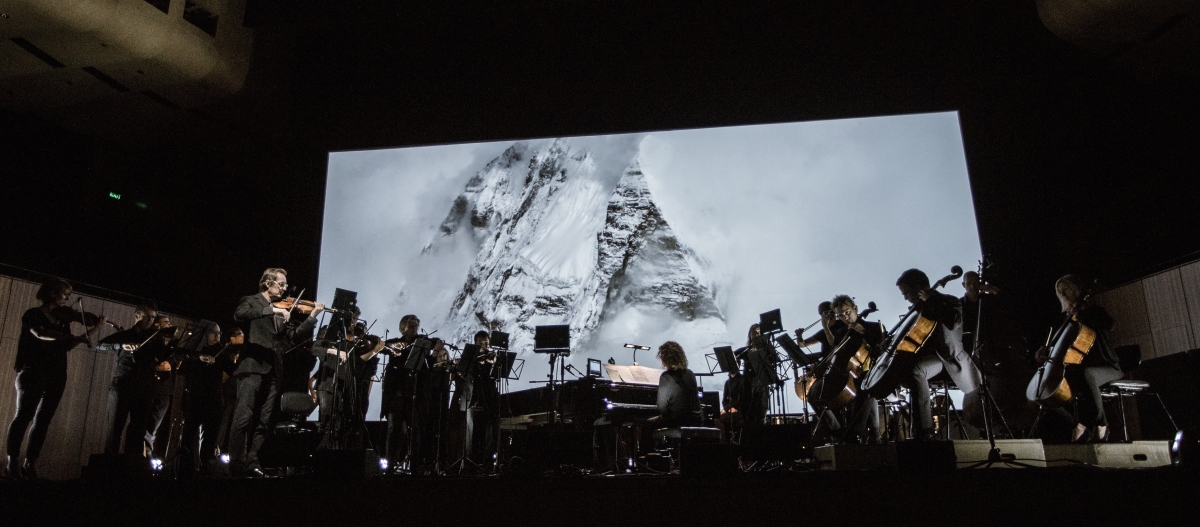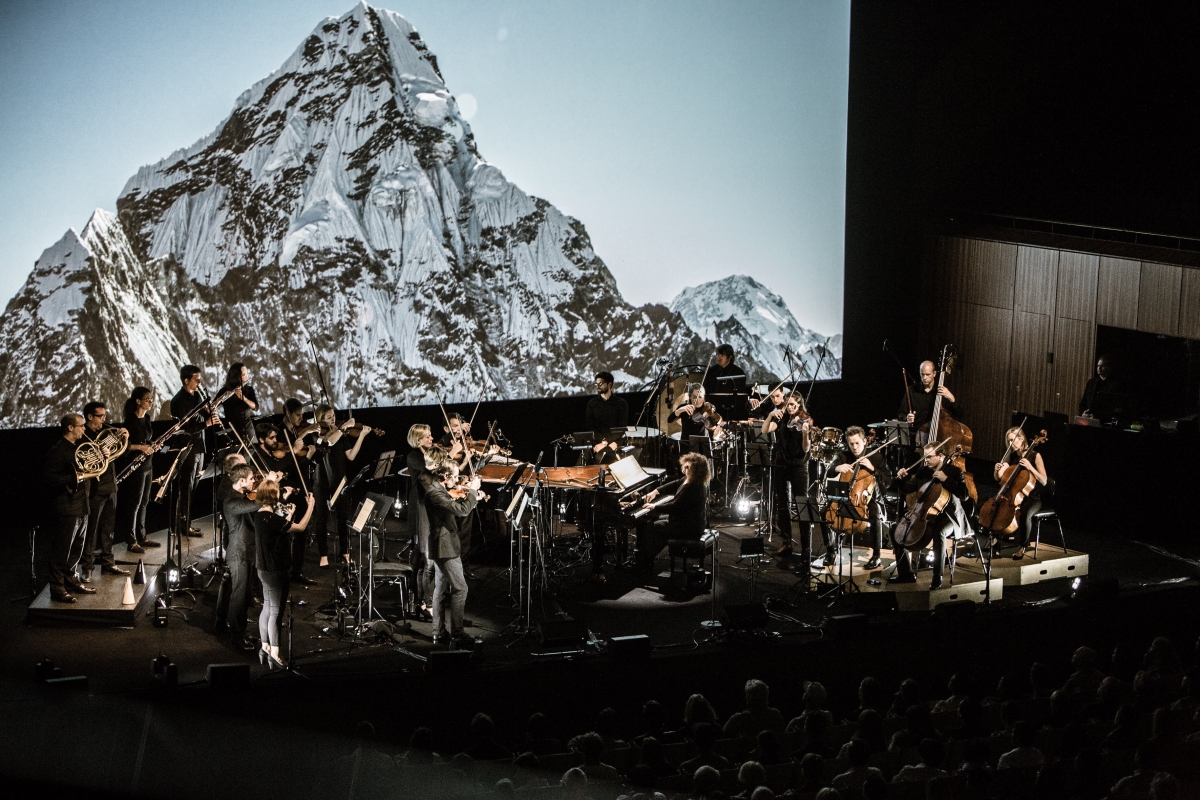The sound of relentless wind accompanies the opening credits of Mountain, the Australian Chamber Orchestra’s latest “cinematic and musical odyssey”. A light shimmer of strings from the orchestra adds to the aural haze as a screen above the Concert Hall stage shows a tiny figure, a single climber in an orange vest sticking to a vast, sheer rockface like an insect. Chilling piano notes drop from Tamara-Anna Cislowska’s fingers as the camera, up close now, looks down on the climber from above, taking in the vertiginous drop below him. The climber on-screen is Alex Honnold, renowned for his free solo ascents – dizzying climbs undertaken without the use of ropes or harnesses. Less than a fortnight ago, Honnold completed the first ever free solo ascent of Yosemite Valley’s El Capitan.
For the world premiere of Mountain, a collaboration between Richard Tognetti and director Jennifer Peedom (director of the 2015 film documentary Sherpa) – presented as part of Vivid Live and the Sydney Film Festival – the audience was an equal mix of classical music fans and mountain climbing enthusiasts, many drawn into the Opera House by the names of Peedom and climber/cinematographer Renan Ozturk.
 The Australian Chamber Orchestra’s Mountain. Photos © Maria Boyadgis
The Australian Chamber Orchestra’s Mountain. Photos © Maria Boyadgis
In a similar vein to the ACO’s 2012 multimedia project The Reef, Mountain marries the music of composers such as Vivaldi, Chopin, Peter Sculthorpe and Tognetti himself with stunning video footage in a poetic exploration of the often fraught relationship between humans and mountains. The film is narrated by Willem Dafoe, with text written by Robert Macfarlane – whose book Mountains of the Mind inspired Peedom’s approach to this project.
The film itself is a poetic rumination on humans’ relationship with mountains. There is little detail conveyed in the narration – though some of the issues explored in Sherpa are touched on, ever so briefly – instead Dafoe asserts broad ideas for which the footage provides evidence in stunningly filmed montages. In addition to the beauty of the landscapes, the montages evoke both the spiritual associations of mountains as well as the compulsion humans feel to view, scale or conquer them – often at great personal risk.
And this sense of risk and danger (the audience inhales audibly as the camera drops over a peak) runs throughout the film and the score, born in part of Tognetti and Peedom’s different reactions to the same imagery. “Where he saw horror and terror, I saw majesty and awe,” Peedom remarks before the screening.
The ACO’s cellos drive the music forward to sweeping shots of green mountains and cold, snow-covered peaks. Dafoe sets the scene by looking back to earlier days of recreational mountain climbing, Chopin’s Nocturne in D Flat Major – deftly dispatched by Cislowska – accompanying grainy old footage of mountain climbers in oufits far less suitable than those worn today (particularly for women). From these comic moments, Mountain explores the range of ways in which humans interact with mountains – whether through religion, sport, tourism or sheer thrill-seeking.
 The Australian Chamber Orchestra’s Mountain
The Australian Chamber Orchestra’s Mountain
Climbers walk along knife-edge ridges suspended far above the earth, hang like fruit from the underside of rocky ledges or traverse plains of meringue-like ice as the ACO produces subtly discordant, ambient music. The brittle crunching of a pick against ice and stone, or the scrape of shoe spikes against a rock-face becomes part of the aural landscape.
A montage of ‘whippers’ – climber parlance for the falls that leave climbers dangling helplessly at the end of their safety ropes – keeps the audience on the edge of their seats, while Vivaldi’s Concerto for Four Violins in B minor and excerpts from the Four Seasons accompanies footage of skiers plowing spectacularly through piles of snow and launching off jumps and cliffs. Death-defying feats, bruising crashes and wild near-misses elicit gasps and nervous laughter from the audience. Satu Vänska puts down her violin to bring haunting vocals to the upbeat, rockier music that accompanies the action shots.
There are times when the visuals are so gripping they sear away any conscious awareness of the music, Tognetti’s score often serving as emotional enhancement rather than focus – crafted specifically for the purpose of heightening the film experience. At other times, though, the music is in the spotlight. Broad aerial shots of mountainscapes become a visual accompaniment to the Larghetto from Beethoven’s Violin Concerto in D Major or the hymn-like Adagio from Beethoven’s Emperor concerto, beautifully rendered by pianist Tamara-Anna Cislowska. In each of those cases the screen turns black and the work finishes in its own time, unbound by the constraints of the film.
While there is no narrative to drive momentum – the film is more essay than story – Mountain is beautifully structured, Peedom and Tognetti cleverly managing the tension and release of the material, both musical and filmic. The breath-taking footage and carefully crafted soundtrack makes for an intensely watchable, gripping experience that is bound to delight lovers of music and mountains alike.
The Australian Chamber Orchestra tours Mountain to Adelaide, Brisbane, Canberra, Newcastle, Perth and Sydney August 3 – 20. Following the National Tour, Mountain will be in cinemas across Australia from September 21.
Update: Tickets have been released for an additional Sydney performance on August 13.











Comments
Log in to join the conversation.